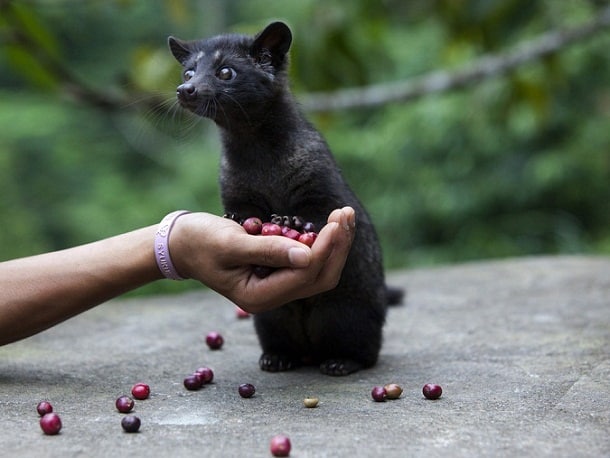Fermented coffee is, quite simply, coffee that has undergone the process of fermentation. It’s popular due to its unique smell and taste (fermentation neutralizes the bitter taste of the coffee beans), healthy properties, and increased shelf life.
In this post, you’ll learn more about the fermentation process, the benefits of fermented coffee, and how fermented coffee is made. You’ll also learn about our very own brand of fermented coffee—Pure Kopi Luwak—and see why it’s an excellent way to absorb all the benefits fermented coffee has to offer.
What is Fermentation?
The biological process of fermentation is the natural breakdown and breakdown of sugars and starches into nutrients that certain types of naturally occurring bacteria and yeasts, which can be found in the environment, fruits, and many other locations, can utilize. A number of organic compounds are produced as byproducts of this process, including organic acids like acetic acid, which is present in vinegar, alcohols like ethanol, which is present in all alcoholic beverages, and gases like carbon dioxide (the gas responsible for the bubbles in carbonated drinks like soda and champagne).
Coffee that has been fermented (sometimes referred to as “cultured coffee”) refers to coffee that has been processed after harvest but before roasting, after the husk and pulp have been removed. Fermented coffee produces scents and flavors that are noticeably different from (and many would argue better than) those of unfermented coffee when it is roasted, ground, and brewed.
Regular coffee that has been fermented after brewing is another variety of fermented coffee. This is accomplished by adding a culture starter—a mixture of certain yeasts and bacteria—to the brew and letting it sit for a few days. Coffee kombucha is a well-known illustration of this kind of fermented coffee; the primary distinction is that fermentation in coffee kombucha occurs after brewing.
How To Ferment Coffee At Home
The easiest way to ferment coffee at home is with the kombucha method. If you’ve never made coffee kombucha before, the most critical step is buying or making a kombucha SCOBY (2). This is what kick starts the fermentation process.

Brew Time: 3-5 Days
Medium: Glass Jar
Ingredients:
a. 2 quarts of brewed coffee
b. 1/2 cup of sugar
c. Kombucha SCOBY
Instructions:
- Combine the sugar and coffee in a glass jar and stir until the sugar is dissolved. Allow cooling.
- Add the SCOBY and cover the jar with a cheesecloth or coffee filter. Use a rubber band to secure.
- Let the mixture sit at room temperature for 3-5 days, away from direct sunlight. Check daily for any signs of rancidity.
- Once you’ve achieved the desired taste, remove the SCOBY and store your coffee in the fridge.
Advantages of Fermented coffee
Coffee fermentation is not only a fad. Fermented coffee is preferred above ordinary coffee for a variety of reasons. But first, a word of caution. You could assume that because the coffee is fermented, it contains probiotics, which are beneficial bacteria that aid in digestion and are present in yogurt. However bear in mind that the fermentation process in coffee happens before the beans are roasted, thus any probiotics present following the fermentation are destroyed during the roast.
Here are just five benefits of fermented coffee, excluding the probiotics:
Easier to digest
Many chemicals that are difficult for the body to digest are changed by fermentation into easier-for-the-body, simpler molecules. It is also simpler to digest than normal coffee because it contains less of some chemical components linked to gastrointestinal discomfort.
Easier on IBS patients
IBS (irritable bowel syndrome) sufferers may find regular coffee irritating, while fermented coffee typically isn’t.
Cleaner and safer
It keeps the beans from deteriorating for a longer period of time and ensures a cleaner, safer drinking experience thanks to certain microorganisms used in the fermentation process that prevent the growth and appearance of fungi in the beans.
Improved taste and aroma
By controlling fermentation conditions, producers can alter the taste and aroma of the coffee to decrease bitter off-notes and increase the overall quality of the coffee.

Fewer Tannins
The tannins you find in coffee, tea, wine and other foods, turn your teeth yellow due to their unique chemical structure. However, fermented coffee has significantly lower levels of tannins, drastically reducing the harm done to your teeth and maintaining your pretty smile. Kopi luwak has especially low levels of tannins, since its fermentation process occurs inside the Asian palm civet cat.
Is the flavor of fermented coffee different?
Yes is the clear-cut response. A lot of people concur that, this type of coffee has better flavor and scent than ordinary coffee. The aroma of coffee is the result of a complex blend of many volatile (easily vaporized) components, more than a third of which are created during the fermentation process. If the beans hadn’t been matured, these scents wouldn’t exist. Fermentation also gets rid of a lot of the coffee’s bitter undertones, leaving behind a sweeter, less bitter beverage that most people like.
Fermentation has always been an essential part of coffee processing but fermenting brewed coffee is less common and unfamiliar to most people. In recent years, there has been a resurgence in the popularity of coffee kombucha, and many coffee companies are experimenting with producing fermented coffee.
Fermented coffee has a unique taste, and making your own is a fun weekend project. Luckily, it’s not hard to make coffee kombucha, and we hope our simple recipe is enough to pique your interest and inspire you to try it out for yourself.

